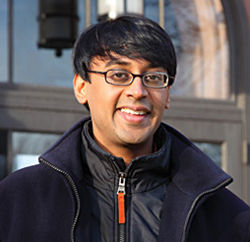Indian-Origin Manjul Bhargava Wins Nobel Prize of Maths
www.mangaloretoday.com
New Delhi, August 13, 2014: Two Indian-origin academicians have won prestigious global prizes in the field of mathematics with one of them being awarded the Fields Medal - known as the "Nobel Prize of mathematics". Manjul Bhargava won the Fields Medal while Subhash Khot won the Rolf Nevanlinna Prize, awarded by the International Mathematical Union (IMU), at the International Congress of Mathematicians 2014 held in Seoul.
Manjul Bhargava won the Fields Medal while Subhash Khot won the Rolf Nevanlinna Prize, awarded by the International Mathematical Union (IMU), at the International Congress of Mathematicians 2014 held in Seoul.
Manjul Bhargava, a professor of mathematics at Princeton University, was among the four winners who have been awarded the Fields Medal, given out every four years.
Iranian-born mathematician and Stanford University professor Maryam Mirzakhani became the first woman to win the Fields Medal this year.
Mr Bhargava was awarded the Fields Medal for "developing powerful new methods in the geometry of numbers, which he applied to count rings of small rank and to bound the average rank of elliptic curves."
According to the award citation, Mr Bhargava’s work is "based both on a deep understanding of the representations of arithmetic groups and a unique blend of algebraic and analytic expertise."
Subhash Khot was awarded the Nevanlinna Prize for his "prescient definition of the ’Unique Games’ problem, and leading the effort to understand its complexity and its pivotal role in the study of efficient approximation of optimisation problems."
His work has led to breakthroughs in algorithmic design and approximation hardness and to new exciting interactions between computational complexity, analysis and geometry.
Mr Khot is a professor in the Computer Science Department at New York University’s Courant Institute of Mathematical Sciences. He has a PhD from Princeton.
Born in 1974 in Canada, Manjul Bhargava grew up in the US and also spent much time in India. He received his PhD in 2001 from Princeton University and became a professor in 2003.
Mr Bhargava’s honours include the Merten Hasse Prize of the Mathematical Association of America (2003), the SASTRA Ramanujan Prize (2005), the Cole Prize in Number Theory of the American Mathematical Society (2008) and the Infosys Prize (2012).
He was elected to the US National Academy of Sciences in 2013.
The Fields Medals were started in 1936 and the Nevanlinna Prize in 1982.
The Fields Medal is awarded on the occasion of the International Congress of Mathematicians to recognise outstanding mathematical achievement for existing work and for the promise of future achievement.
The candidates in fray for the medal must be below the age of 40.
The Rolf Nevanlinna Prize is awarded once every four years at the International Congress of Mathematicians, for outstanding contributions in Mathematical Aspects of Information Sciences including all mathematical aspects of computer science, including complexity theory, logic of programming languages, analysis of algorithms, cryptography, computer vision, pattern recognition, information processing and modelling of intelligence as well as scientific computing and numerical analysis.
Courtesy: NDTV
- Mangaluru: Commissioner denies misuse of police vehicle during Waqf protest, cites medical emergency
- Belthangady: Autorickshaw overturns near Ujire; driver seriously injured
- Chikkamagaluru: KSRTC driver attempts suicide over alleged harassment by senior officer
- Former don Muthappa Rai’s son injured after being shot at in moving car near Bidadi house
- Mulki: Top portion of Bappanadu temple chariot collapses during Rathotsava; none hurt
- Belthangady youth slips to death in Cauvery river
- Kundapur: Speeding Omni fatally knocks down pedestrian
- Snehalaya and Janamaithri Police launch anti-Drug awareness drive at Uppal and Hosangadi
- Mangaluru: Fight will continue till amendments to Waqf Act are withdrawn, say Muslim leaders
- Direction to remove Janivara would have come with the knowledge of the govt., says Poojary
- JEE (Main) second edition results to be announced by April 19: NTA
- Three arrested for raping woman in Mangaluru, say police
- Summer rush: Special trains, Vande Bharat sleeper announced for Mangaluru
- Honour to speak with PM Modi, will visit India later this year: Elon Musk
- India tears into Yunus regime over Hindu leader’s killing in Bangladesh
- Two homeguards suspended for asking students to remove sacred thread at Shivamogga college
- Caste census report politically motivated, says R Ashoka
- PM Modi to visit Saudi Arabia from April 22-23
- 4 dead, many feared trapped as building collapses in Delhi’s Mustafabad
- Kerala teacher acquitted as student confesses fake rape allegation
- CET officials booked for asking students to remove sacred thread at exam centre in Shivamogga
- BJP worker found hanging in Bengaluru outskirts, video message names ‘local leader’
- CET row: Karnataka govt orders probe after students asked to remove sacred thread
- Man who flashed woman, assaulted 7 people arrested in Bengaluru
- FIR against Sunny Deol, Randeep Hooda for offending Christian religious sentiments in Jaat
- Skills and Competencies Take Center Stage at MSN Dialogue Series
- Court remands Maoist Lakshmi to six-day police custody
- Sandhya Shenoy honored with Society for Materials Chemistry Medal-2024
- White Cornus Apartment in Mangaluru
- City girl wins first place in state-level spell bee competition
- Alleged ‘Love Jihad’ Case in Mangaluru: Woman left home voluntarily, says police
- Girl fatally struck by reckless two-wheeler near Belman
- New residential complex for the judges inaugurated in Mangaluru
- Absconding accused nabbed after 8 years
- Truck with cylinders turns turtle in Beltangady
- Bhoota Kola artist dies of cardiac arrest
- Development of the country should be our goal: Ganesh Karnik
- Container truck gets stuck under Modankap railway bridge
- Truck crushes bike’s pillion rider near BC Road
- Head constable dies of heart attack
- CITY INFORMATION
- TRAVEL
- TOURIST INFORMATION
- HEALTH CARE
- MISCELLANEOUS




 Write Comment
Write Comment E-Mail To a Friend
E-Mail To a Friend Facebook
Facebook Twitter
Twitter  Print
Print 


